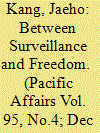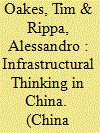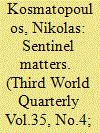| Srl | Item |
| 1 |
ID:
187422


|
|
|
|
|
| Summary/Abstract |
The South Korean response to the COVID-19 pandemic was mainly characterized—whether positively or negatively—as the efficient implementation of surveillance supported by the extensive deployment of information and communication technologies (ICTs). Yet, the fact that the South Korean management of the pandemic was also maintained by citizens’ voluntary participation in stringent quarantine policies has received little critical attention. Through the lens of techno-politics, this essay examines the distinctive interplay of digital monitoring systems and civic engagement in South Korea during the pandemic, with particular reference to data surveillance, horizontal collectivism, and a networked multitude. In capturing the essential features of South Korean pandemic politics as reflecting key components of techno-populism, this essay draws out some social theoretical implications of reconsidering the increasingly close relationship between technology and democracy in the pandemic period.
|
|
|
|
|
|
|
|
|
|
|
|
|
|
|
|
| 2 |
ID:
192619


|
|
|
|
|
| Summary/Abstract |
Despite China's leading role in the construction of infrastructure over the past decades, the most influential paradigms for the study of infrastructure in the social sciences originate from research conducted elsewhere. This introduction to the special section “Chinese Infrastructure: Techno-politics, Materialities, Legacies” seeks to address this apparent gap, and contributes to building an innovative research agenda for an infrastructural approach in the China studies field. To do so, it pushes forward an understanding of infrastructure as both an empirically rich material object of research and an analytical strategy for framing research questions. We draw from two strands of inquiry: recent efforts to rethink the materiality of infrastructures not as an inert or stable basis upon which more dynamic social processes emerge, but rather as unstable assemblages of human and non-human agencies; and scholarship that explores the often hidden (techno-)political dimensions of infrastructures, through which certain intended and unintended outcomes emerge less from the realms of policy and implementation and more from the material dispositions and effects of infrastructural formations. These strands of inquiry are brought together as part of our effort to recognize that the infrastructural basis of China's approach to development and statecraft deserves a more concerted theorizing of infrastructure than we have seen thus far.
|
|
|
|
|
|
|
|
|
|
|
|
|
|
|
|
| 3 |
ID:
133257


|
|
|
|
|
| Publication |
2014.
|
| Summary/Abstract |
In this article I focus on the crisis experts in Lebanon and, in particular, on one celebrated expert response to crisis, the crisis report. I suggest looking at the report as a techno-political tool that seeks to produce and disseminate knowledge about crisis and conflicts in different parts of the world, while packaged and structured in a universal format. As a first step I analyse the particular features of this format, such as size and scale. The main argument is that the report presents itself as an assemblage of a series of technical characteristics that help to shrink the world and make it fit the model format of the crisis expert. In a second step I open up the perspective and link the report's micro-format to bigger questions on governing the world today. Here, I argue that, within current imaginaries of emergency, impending crisis and global terrorism, the crisis report functions as a particular kind of sentinel. I show that it can speak through the language of constant alertness and, crucially, the production of sentinel subjectivities that must be continuously monitored.
|
|
|
|
|
|
|
|
|
|
|
|
|
|
|
|